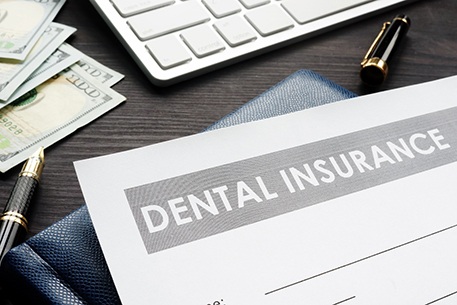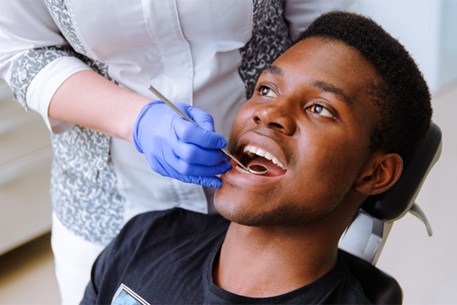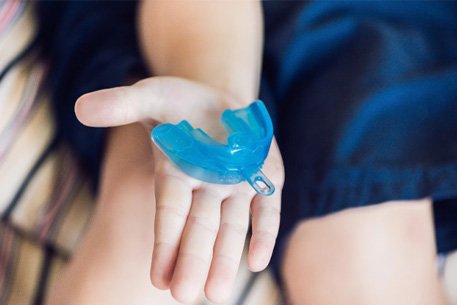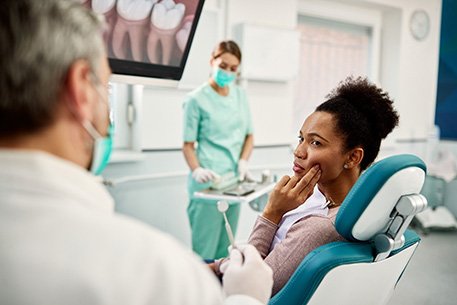Emergency Dentist — Cottonwood Heights, UT
Get the Urgent Care You Need Fast
No one wants to deal with a dental emergency, but the worst thing you can do is simply ignore it and assume it will get better on its own. The good news is when you need emergency dentistry in Cottonwood Heights most, Dr. Hansen and his team are here to help. Not only is Dr. Hansen trained to handle a variety of dental emergencies, but he’s happy to schedule same-day emergency appointments. Simply give us a call and we’ll get you set up as soon as possible!

Why Choose White Peak Dental for Emergency Dental Care?
- Same-Day Emergency Appointments Available
- Highly Experienced Dentist Dedicated to Your Comfort
- Powerful Sedation Dentistry In-House for Anxious Patients
What to Do in a Dental Emergency

- Get your same-day appointment scheduled: The moment you notice something isn’t right, call our office so you can get a same-day appointment set up. Not only can we schedule your visit, but we can provide first-aid tips over the phone. We are open five days a week, so don’t hesitate to call even if you’re unsure you’re having a dental emergency.
- Receive an emergency exam and get pain relief: Once we know what’s causing your dental emergency, we can begin providing you relief to get out of pain. As part of this process, we’ll perform an exam and potentially capture digital X-rays if necessary.
- Discuss your options after hearing our findings: After learning the cause and severity of your emergency, we’ll recommend a treatment plan to stop it from worsening or coming back. This plan will include estimated costs and an expected timeline as well, so you’ll have as much information as possible before making any decisions.
- Complete your treatment with our team: Our experienced team is prepared to help you get the care you need, whether it involves dental fillings, crowns, root canal therapy, extractions, or another service entirely.
The Most Common Dental Emergencies
Some of the most common types of dental emergencies include toothaches and damaged teeth, but they can come in many different forms. The best thing you can do is call our office right away so you can get your emergency treated, no matter how minor or severe. Some of the most common emergencies we treat (and how to manage them before you arrive) can be found below.
Understanding the Cost of Dental Emergencies

Without knowing what is happening inside your mouth, we won’t know for sure how much your dental emergency will cost. Following an evaluation of your smile, we can make recommendations from there. Once we know the best treatment for your needs, we can begin providing cost estimates. Our team will always break down what you can expect to pay before beginning treatment. Just keep in mind that putting off your necessary care can allow the emergency to get worse, leading to higher costs anyway. Compared to a medical emergency, you may be surprised by the affordability of your emergency exam.
Every Dental Emergency is Different

It’s impossible to predict the overall cost of your care without knowing the root cause of your symptoms. Depending on the severity of your emergency, we will recommend treatments that most effectively address your symptoms. While simple solutions like dental fillings or prescription mouthwashes could be all you need, you could also require dental crowns, root canal therapy, or even an extraction to protect your oral health. These come with other associated costs, such as dental restorations. Before you make any decision on your care, you’ll be able to see the details of your costs and treatment options before we perform any service.
Does Dental Insurance Cover Dental Emergencies?

In most cases, dental insurance providers will offer some level of coverage for dental emergencies. This usually includes coverage for one annual emergency exam. In other cases, they offer partial coverage for services to treat specific issues. Generally, treatments like dental crowns, root canal therapy, and extractions receive between 80% and 50% coverage. If you have dental insurance, be sure to examine its yearly maximums and when they come into effect. Our team is happy to help look over your plan and maximize your benefits to the fullest.
Other Options for Making Dental Emergencies Affordable

If you do not have dental insurance at this time, we do offer other options to make your care more affordable. For example, our in-house membership plan provides coverage for one emergency exam and X-ray every year. Enrolling can help make your dentistry more predictable and less costly overall. We encourage you to speak with our front desk about our membership plan as well as other options to finance your emergency dentistry.
Taking Care of Your Smile Can Save You Money

It’s true that some dental emergencies are impossible to avoid, but there are ways you can reduce your risk and lower your oral healthcare costs along the way. Did you know that most dental emergencies occur as a result of poor oral hygiene? By staying on top of your at-home brushing and flossing and completing biannual dental checkups, you prevent and catch dental issues before they become dental emergencies to begin with!
Furthermore, the moment you’re aware a dental emergency is present, don’t wait to get it settled. Call our office immediately so you can prevent it from rapidly worsening. Think of it this way, a tooth that develops a cavity and only needs a dental filling now could end up needing a crown or root canal therapy the longer you wait.
How to Prevent Dental Emergencies

Most dental emergencies can be prevented when you know the right tips to keep in mind day-to-day. Because these unexpected situations are often stressful and scary, it’s always easier to keep them from happening than it is to deal with when one pops up. Below, we’re sharing a few simple ways you can drastically lower your risk of dental disaster. Should you find yourself experiencing a dental emergency in Cottonwood Heights anyway, don’t hesitate to give our office a call .
Visit Your Dentist Regularly

Everyone should be visiting their dentist every six months for a checkup and cleaning. These routine appointments allow us to spot and treat problems before they turn into painful complications. We’ll also perform a thorough examination and cleaning to keep issues from happening in the first place. Our team will do everything possible to keep your smile in tip-top shape.
Maintain Good Oral Hygiene Habits at Home

Taking proper care of your teeth and gums is essential for a healthy mouth. Brushing twice a day, flossing daily, and rinsing every day with an ADA-approved mouthwash are excellent practices that’ll help keep your oral cavity free of harmful particles and bacteria. Following a solid dental hygiene routine every day will lower your chances of needing to visit your emergency dentist in Cottonwood Heights.
Be Careful with Your Diet

Believe it or not, your diet has a significant impact on oral health. Overindulging in sugary, starchy, or acidic foods will put you at risk of several dental problems (i.e., cavities, decay, gum disease). It’s strongly recommended that you stick to a diet full of nutrient-rich foods like fruits, vegetables, whole grains, lean proteins, and dairy products. Not only will these keep your waistline slim, but they’ll improve your oral health.
Wear a Mouthguard

If you regularly play sports, you should ask our team about a custom-made mouthguard. The device will protect your pearly whites from any impact should you sustain a blow to the face. For those who grind their teeth at night, a nightguard is an excellent way to keep the enamel safe. It’ll protect your smile from the force of your teeth grinding at night.
Use Tools, Not Teeth to Open Packaging

When you can’t crack open a bottle or tear open a package, you may be tempted to use your teeth as a last-ditch effort. Well, using your pearly whites for anything other than chewing food can easily cost you a trip to your emergency dentist in Cottonwood Heights. It’s always best to wait until you have the right tool or ask someone to lend you a helping hand.
Dental Emergency FAQs

We understand that it’s never easy going through a dental emergency, especially alone. When you don’t have anyone to ask questions, it can make you feel uncertain about the health and look of your smile. For that reason, we’ve included some of the most common questions we’ve heard at our office over the years below for your convenience. Don’t wait to give us a call if you have concerns or worried you may be dealing with a dental emergency.
Can the emergency room remove a tooth?
Only a licensed dentists can perform treatments like tooth extractions, which means anyone without a license is performing the treatment illegally. This is because dentists must undergo training and education to complete a treatment like this. Most hospitals don’t have dentists on staff, so if you’re expecting them to remove your tooth (or perform other treatments commonly done in dental offices), you’re out of luck. At best, they may provide painkillers or antibiotics, but still tell you to go to a dental office instead. Keep in mind that a tooth extraction may not even be the best option to get you out of pain. Root canal therapy could be performed instead, which gets you out of pain and lets you keep your tooth.
Are toothpicks safe to use?
Toothpicks of any kind, especially wooden ones, are not safe to use. Not only can they easily damage enamel or gum tissue, but wooden toothpicks could splinter and break inside your mouth, causing debris to get stuck and trigger an infection. If you are worried about getting food debris out of your mouth, using a toothpick could push it even further either between your teeth or underneath your gum line. For that reason, it’s best to brush and floss instead or call our office if you’re struggling to remove debris from your mouth.
Should knocked-out teeth be placed in water?
Water can be used to rinse a knocked-out tooth of any dirt or debris, but you should not submerge them in water as a way to keep them preserved. Water can actually damage the root surface cells on teeth, which makes it harder to reimplant them back into the mouth. A better option would be to place it back into your open socket or a tooth preservation kit. Milk or saline solution are also good options. Just keep in mind that it will only remain preserved for about an hour before reimplantation becomes inviable.
Does emergency dentistry cost more?
Emergency exams are not particularly expensive in most cases, but the services necessary to resolve and manage them do cost more than preventive care like exams and cleanings. For example, fillings, crowns, root canal therapy, and extractions will always carry higher price tags because of their restorative nature. With that said, the sooner you get seen by our office the better because you’ll reduce the chances of needing more expensive dentistry to treat your symptoms. If you lack dental insurance coverage, our office will help you create a financing plan that makes your emergency care possible.
Will my toothache go away on its own?
In most cases, toothaches don’t just fade on their own. They typically persist until their underlying causes are addressed.
Given this reality, it’s crucial to have a dentist assess your oral pain. Various factors can contribute to toothaches; you’ll want to rule them out with a dental professional. Doing so will treat any underlying issues before they become serious.
Granted, there are rare situations where a toothache goes away naturally. One example is minor gum irritation around a tooth that slowly stabilizes. However, you’d still want to see a dentist for help. It’s better to be safe than sorry.
How should I sleep with tooth pain?
If you can’t treat it in time, you may have to sleep with tooth pain. Should that happen, you’ll want to take the following steps:
- Elevate Your Head – As best you can, sleep with your head elevated on a thick pillow or several pillows. Elevation relieves pressure caused by blood flow into the head and mouth.
- Take Medication – To relieve your discomfort, take store-bought pain relievers as needed. (You can maximize these medications’ effects by avoiding acidic, cold, or hard food before bed.)
- Use Good Tools – In bed, apply a cold compress to the affected area. It’ll help reduce some of your aches.
Do I need to visit for minor chips to teeth?
Even if they don’t hurt, you should see a dentist for minor tooth chips. Whether chipped, fractured, or broken, teeth can’t regrow lost enamel. Instead, they’ll just suffer further damage if left untreated. (A sharp or jagged tooth could even cut against your gums by accident.)
Depending on a chip’s severity, dentists have several ways to treat this issue. One option is to repair the damage with filling material, which will help the tooth look and feel better. Another, meanwhile, is to polish and smooth out the chipped area. For a more severe crack or fracture, though, the dentist may need to place a crown to prevent further harm.
What does chronic bad breath mean?
Unfortunately, chronic bad breath isn’t just caused by “morning breath” or a smelly meal. It’s usually a sign of a serious oral health problem.
There are several potential causes of chronic bad breath. These factors include cavities, gum disease, and even tooth infections. At the same time, a bad-smelling mouth can also stem from smoking and tobacco use in general.
Call a dentist at once if your bad breath persists for an extended period (i.e., more than a few days). They can confirm whether any underlying problems are present.
